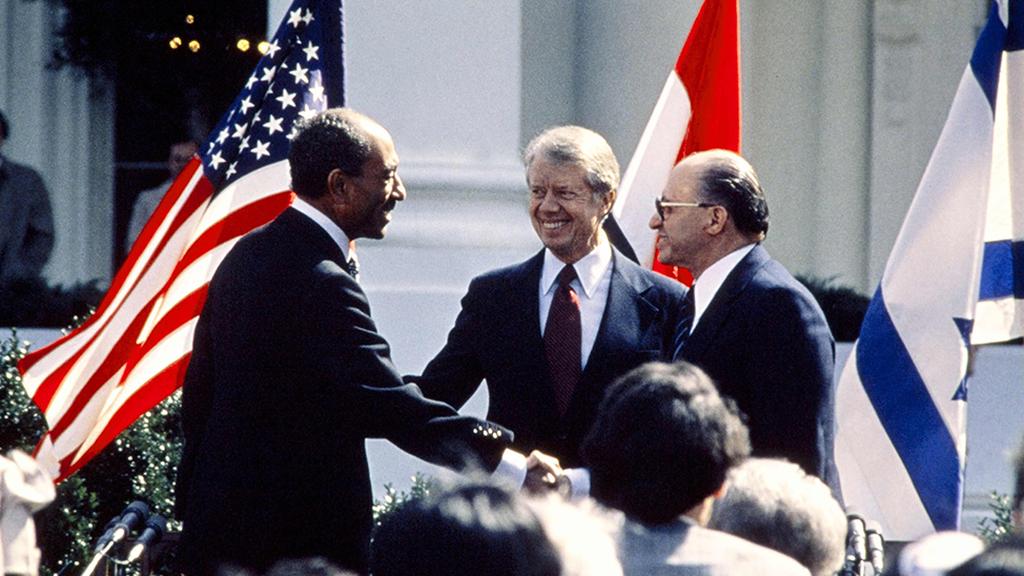The first public statements by the new Israeli foreign minister caught some people off guard.
Gabi Ashkenazi described U.S. President Donald Trump’s Middle East peace plan as an “historic” opportunity to shape Israel’s future borders.
He said that the proposal, which envisions Israel’s annexation of about 30% of the West Bank, would “be advanced responsibly,” while highlighting the need to safeguard the country’s alliances with Egypt and Jordan.
6 View gallery


L-R: King Hussein of Jordan, U.S. President Bill Clinton and Prime Minister Yitzhak Rabin at White House for the signing of the 1994 peace agreement
(Photo: Courtesy of the National Library)
Ashkenazi and others may believe that they can implement the Trump plan and still maintain peace with Cairo and Amman, but that is wishful thinking.
Israel’s alliance with Egypt and Jordan is based on a trade-off.
The 1979 peace treaty between Israel and Egypt was meant to be followed by a subsequent final accord with the Palestinians. At the time, the Hashemite Kingdom specifically demarcated the Jordan River as its future border with Palestine.
Ayman Safadi, the Jordanian foreign minister, made it very clear that Amman only agreed to formalize its frontier with Israel as part of the nations’ 1994 peace treaty after the signing of the Israeli-Palestinian Oslo Accords a year earlier.
The latter deal and all other post-June 1967 international resolutions are based on an important principle, which is included in the preamble of UN Security Council Resolution 242: namely, the “inadmissibility of acquiring land by war.”
6 View gallery


L-R: Egyptian President Anwar Sadat, U.S. President Jimmy Carter and Prime Minister Menachem Begin at the White House for the signing of the 1979 peace agreement
(Photo: AFP)
Israel has to accept that its peace agreements with Egypt, Jordan, and the Palestine Liberation Organization are founded on that understanding.
When Egypt and Israel had a disagreement over a square kilometer of land in Taba, the issue was resolved through international arbitration. For its part, Jordan agreed to lease Israel two tiny enclaves that would be used by Israeli farmers for 25 years.
When that period elapsed, and after having informed Israel a year before its expiry that the lease would not be renewed, Amman was able to regain total control over these small strips of land in 2019.
6 View gallery


King Abdullah and his son pray in the former Israeli farmed enclave returned to Jordan
(Photo: Courtesy)
By contrast, any attempt by Israel to unilaterally annex – or “extend sovereignty” to – Palestinian territories that were captured illegally defies all precedent, despite what Ashkenazi has to say. If every country more powerful than its neighbor sought to acquire the latter’s land then the world would be engulfed in chaos.
Some states justify their aggression based on their own unique interpretation of history. For example, Saddam Hussein always considered Kuwait an integral part of Iraq. After the Iraqi invasion in 1990, Hussein referred to Kuwait as Iraq’s 19th province. Meanwhile, Russia has claimed that its annexation of Crimea was appropriate given that Ukraine was a former satellite of the Soviet Union.
These modern-day justifications may even resonate more loudly than attempts by Israel and some of its Christian Zionist supporters to advocate some kind of divine right to the West Bank.
Jordan’s total rejection of any Israeli annexations is based not only on the fact that this would negate one of the key pillars of its peace treaty with Israel but also because of the probable direct impact on the stability of the Hashemite dynasty.
King Abdullah II has been able to rule over Jordan only by balancing the needs of various tribes against those of East Bank Jordanians and Palestinians – some of whom lived in Jordan before 1967, and also prior to 1948, although most arrived as refugees following major wars with Israel in those years.
This sensitive dynamic has been possible only through the careful and thoughtful distribution of jobs, power, and resources. For the most part, East Bank Jordanians earn their livelihoods in the public sphere or by joining the security apparatus, whereas those of Palestinian origin work mainly in the private sector.
Over time, mixed marriages created families consisting of both cohorts, and the late King Hussein was wise enough to insist on granting rights to all Jordanians, irrespective of where they came from.
But this arrangement is also dependent on the ability of Palestinians in the occupied West Bank and Gaza Strip to create their own independent state and have close relations with their neighbors, including Israel, Jordan, and the greater Arab World.
This was the basis of the various agreements forged with Israel as well as the Saudi-led 2002 Arab Peace Initiative, which was approved by regional leaders and thereafter by all members of the Organization of Islamic Cooperation.
Jordan has been adamant that it will not sit idly by if the status quo is changed in any way, or if international law is violated.
In fact, Jordan last October withdrew its ambassador from Tel Aviv in protest over the detainment of two Jordanian students without them being formally charged. If the annexation plan is implemented, Amman has already set the bar high and will act in a much more forceful way.
6 View gallery


Prime Minister Benjamin Netanyahu meeting with King Abdullah in Amman in 2014
(Photo: GPO)
As the first Arab country to become a member of the International Criminal Court in The Hague, Jordan will not hesitate to pursue legal recourse against Israel.
Prime Minister Benjamin Netanyahu, Defense Minister Benny Gantz, Foreign Minister Gabi Ashkenazi and the entire Israeli leadership will be accused of perpetrating war crimes if Israel presses forward with the Trump peace plan.
Any such move will be viewed as the theft of Palestinian lands – and those responsible will have to pay for their actions.
Daoud Kuttab is an award-winning Palestinian journalist and former Ferris Professor of Journalism at Princeton University
Article reprinted with permission from The Media Line
First published: 08:27, 05.22.20



